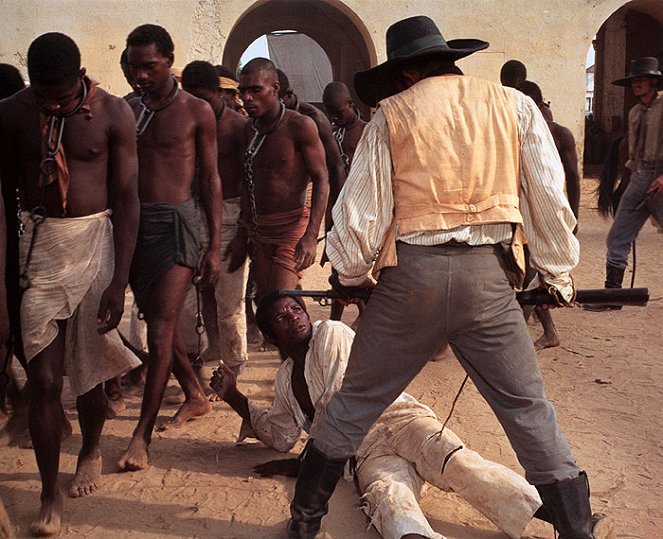Rendező:
Gillo PontecorvoZeneszerző:
Ennio MorriconeSzereplők:
Marlon Brando, Evaristo Márquez, Renato Salvatori, Giampiero Albertini, Carlo Palmucci, Dana Ghia, Cicely BrowneTartalmak(1)
Queimada kis karib tengeri sziget az 1800-as években. A természet földi paradicsommá tette, az ember pokollá. A portugál gyarmaton az óriási bevételt hozó cukorültetvényeken nyomorúságban tengődő rabszolgák fellázadnak kizsákmányolóik ellen. Az angolok nem késlekednek a beavatkozással: William Walker angol zsoldoskatonát (Marlon Brando) azzal a céllal küldik a szigetre, hogy tovább szítva a felkelést, az angolok kezére játssza a cukorkereskedelmet. (Fantasy Film)
(több)Recenziók (5)
Marlon Brando in the lead (Positive? Negative?) role of a film with a still relevant idea. In short, if the powerful want something, they will get it anyway, and it doesn't matter if they just bribe someone for their plans or if they start a revolution and a war by snapping their fingers, promises and false hopes. People are just pawns to them. But wait a minute... Is it really that, uh, black and white? Pontecorvo's direction doesn't initially show scenes like the bank robbery or the attack on the village, but it's only a good thing, because we get to "enjoy" the battles and the dying in the second half of the film to the point of being horrifying. Apart from Brand's excellent performance, a big plus point must of course be attributed to Ennio Morricone's impeccable music.
()
If you've ever wanted to make your own revolution, here are clear instructions how to do it. And what will you need? Charisma, scheming talents, eloquence, cynicism and, above all, the ability, under all circumstances, to keep the pragmatic perspective of someone who takes all these lofty speeches, ideas, oppression, slavery, class differences, human destinies, death, and violence in such a way that they exist only to be taken advantage of. It's hard to say whether it is the best, but in any case, it’s the most interesting and most ambiguous role of Brando's career, which is richer than any other in interesting and ambiguous characters. Today, this would be a blockbuster film about a black leader who leads his people to freedom; at the time of its creation, most filmmakers would have settled for a classic left-leaning revolutionary film about a hero of the people; but not Pontecorvo, who (again) was miles ahead of (not only) his time.
()
Director Gillo Pontecorvo is known, among other things, for his documentary-style war drama, The Battle of Algiers, and he was one of the left-leaning filmmakers of his generation. Even in this case, he does not deny his political commitment. It does not make sense to consider Burn! a classic adventure spectacle set in the backdrop of an exotic Caribbean island. Pontecorvo directed a political drama, in which he deals with the much-debated topic of neocolonialism in Euro-American intellectual left circles in the 1960s, through the story of the strange alliance and subsequent conflict between British emissary William Walker and indigenous rebellion leader José Dolores. After World War II, European colonial empires quickly disintegrated, but former centers of power attempted to maintain their influence indirectly through supporting cooperative local leaders, corruption, and pressure. On the island of Queimada, controlled by the Portuguese, British agent Walker arrives with the aim of driving out the colonial rulers with the help of local residents and facilitating the penetration of British capital into the area. He selects a suitable leader for the popular uprising and provokes the local elites to declare independence. However, the abolition of slavery does not mean an improvement in the living conditions of ordinary people, and once ignited, the spirit of rebellion continues to burn within society. The character of William Walker is exceptionally well-written, ambiguous, complicated, and contradictory in his actions and goals. Walker is an excellent observer, analyst, and organizer, as well as a dangerous manipulator and cynical pragmatist who serves whoever pays him. But he is also a person who understands the difficult fate of the people "down there" and has no problem improving their position. Perhaps even by pushing the ruling class against the wall at the right moment. On the other hand, Dolores perfectly embodies the schematic ideas of a decisive and uncompromising revolutionary leader, as envisioned by supporters of Fidel Castro and the Cuban revolution. In the confrontation of these two characters, Gillo Pontecorvo predictably stands firmly with the popular leader. Unfortunately, practical experience derived from studying history speaks unequivocally in favor of opportunists like Walker. Reformers succeed, not saviors. They know how to destroy, but they cannot handle the role of negotiators, creators, and guarantors, often ending up as self-righteous authoritarians like Mugabe or desperate failures capable of dragging their surroundings down with them. Marlon Brando's performance as William Walker deserves attention and is one of the most interesting roles in his long and extensive career. Overall impression: 65%.
()
Genius puppet master Brando changes the history of the island of Queimada before our very eyes. His captivating acting performance and the never-forgotten theme of revolution form the foundations of the entire movie. José Dolores is Walker’s adept ally and enemy in one and their final meeting is simply breathtaking. Perfect acting. Overall this picture is pretty dated and lots of battles take place somehow in the background, but this doesn’t make it any less powerful.
()
Galéria (7)
Photo © Metro-Goldwyn-Mayer


Hirdetés